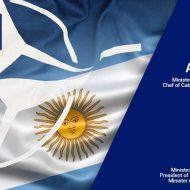By Ali Rıza Taşdelen
We can say that Turkey is expanding its diplomatic influence over Africa in recent years, increasing its trade volume and its infrastructure investments, and is gaining more and more military alliances in the region. This, of course, has not only put France, but also the United States, the EU and the entire Western world or the Atlantic camp in general, into some deep concerns.
However we have chosen this headline for our article, as we will focus more on the evaluation of the French imperialism’s economic, political and military decline of influence in Africa. Of course, Africa could not be excluded from the new polarizations taking place all around the world. Africa, which has a population of 1.2 billion, 60 percent of whom are younger generations under the age of 25, with a growing economy and abundant natural resources such as oil, natural gas, gold, uranium, diamonds, copper and many more, takes all the eyes on itself.
We have witnessed the birth of a new world order since the 2000s. We are witnessing the collapse of the imperialist Atlantic camp and the rise of Asia, where a new world is being born. Now in the 2020s, everyone agrees that this rhetoric is no longer a claim, but rather has become a reality accepted by the entire world. To put it more clearly, there are the United States, France and the UAE on one side, and Asia’s leading actors such as China, Russia and Turkey on the other side in Africa.
Last month, I have written a three-part article with the title “The New World and Africa”, back in July. The first part was named “The end of the French colonialism”, the second was named “The Age of China in Africa”, and the third “Russian comeback in Africa”, and this fourth article named, The Turkish Initiatives in Africa and the particular concerns of France.
S-400s, Syria, Libya and the Eastern Mediterranean
Let us quickly remember the events that caused the tensions between Turkey and France to rise: The shipment of the S-400 missile systems to Turkey back in July 2019 and the start of the Operation Peace Spring in October 2019 were the important turning points, when Turkey has moved crossed the boundaries put up by the NATO and the Atlantic camp. And the first voice against these developments came from the French President Emmanuel Macron. In summary, Macron said, “There is not a coordination between the United States and other members of NATO. We have some common interests in Syria, but the NATO member Turkey is taking aggressive actions without any coordination with other members. The United States has severely damaged NATO alliance, by abandoning its Kurdish allies in Syria. This aggression by Erdogan has also done a great damage to NATO as well”, adding that “We are experiencing the brain death of NATO”.
Turkey continued its well-dedicated stance, which was away from the Atlantic and towards the Asia:
In November 2019, an Agreement was signed between Turkey and Libya on the Delimitation of Maritime Boundaries.
The start of oil and gas exploration activities by Turkey in the Eastern Mediterranean, has further strained Turkey’s relations with France in 2020. French President Emmanuel Macron, who supported the PYD/PKK in Syria, General Haftar in Libya and Greece in the Eastern Mediterranean, has tried to confront Turkey on all sides.
France being concerned about Turkey
As the United States has gotten into a decline and the French colonialism has gotten into a total collapse in Africa especially during the past decade, the Asian leading actors such as China, Russia and Turkey have embarked on a rapid development in the economic, military and diplomatic fields.
The French newspaper Le Monde has reported that the already existing Turkish-France conflict has now moved over to Africa as well, with an article titled “Growing Turkish influence in Sahel sparks concern”. The article, written by Hannah Armstrong on the International Crisis Group (ICG) website, based on a report published on July 27th this year, says that France is heavily concerned about the Turkish relations in the Sahel region, which includes Senegal, Chad, Burkina Faso, Mali and Nigeria. The Turkish relations here reach well beyond economic ties.
The bilateral defense agreement signed between Niger and Turkey in July 2020, is given as an example in the article. It is also given in the article that the agreement also includes the deployment of Turkish troops to Niger for training and advising Nigerien forces, which shares a border with Libya, in their fight against the terrorist group Boko Haram, and securing their borders with Mali and Burkina Faso.
Turkey is taking the place left by France
The French discomfort with Turkish involvement in in Africa was also said to be extensively expressed by the Defense Minister Florence Parly herself. In a speech to the French National Assembly, Parly said that Turkey was “trying to impose itself in Africa” and trying to discredit France in the meanwhile.
While the ICG report is stressing that the Turkish Foreign Minister Mevlut Cavusoglu was the first foreign official to visit the military government in Mali, who overthrew the previous pro-French government of Ibrahim Boubacar Keïta (IBK) on August 20th last year, the report also tells that some who agree with Armstrong, considering this visit as a sign of Turkish support for the coup d’état. This itself is perceived as an attack on the French interests represented by IBK.
Macron had announced on June 10th that he would withdraw the French troops (Barkhane Force) who had been in Mali for nine years to supposedly fight the terrorism in the region. Armstrong is saying “This change in strategy leaves space and creates opportunities for emerging players like Turkey”.
According to the ICG, this religious link promoted by Ankara appeals to Sahelians: “Many of them have welcomed Turkey as a major international player, with whom they have more in common than Europe, Russia or China.”









Leave a Reply